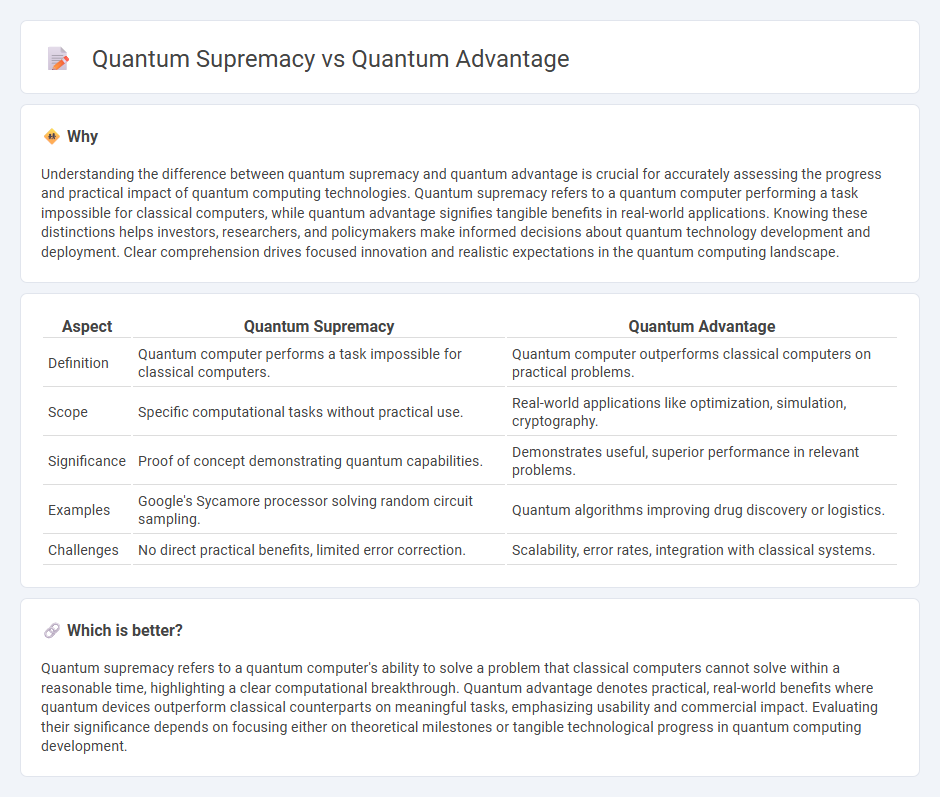
Quantum supremacy represents the milestone where quantum computers perform tasks beyond the reach of classical supercomputers, showcasing the raw power of quantum processing. Quantum advantage focuses on practical and commercially relevant applications, achieving superior performance in solving specific problems compared to classical systems. Discover more about how these concepts are transforming computing and driving innovation.
Why it is important
Understanding the difference between quantum supremacy and quantum advantage is crucial for accurately assessing the progress and practical impact of quantum computing technologies. Quantum supremacy refers to a quantum computer performing a task impossible for classical computers, while quantum advantage signifies tangible benefits in real-world applications. Knowing these distinctions helps investors, researchers, and policymakers make informed decisions about quantum technology development and deployment. Clear comprehension drives focused innovation and realistic expectations in the quantum computing landscape.
Comparison Table
| Aspect | Quantum Supremacy | Quantum Advantage |
|---|---|---|
| Definition | Quantum computer performs a task impossible for classical computers. | Quantum computer outperforms classical computers on practical problems. |
| Scope | Specific computational tasks without practical use. | Real-world applications like optimization, simulation, cryptography. |
| Significance | Proof of concept demonstrating quantum capabilities. | Demonstrates useful, superior performance in relevant problems. |
| Examples | Google's Sycamore processor solving random circuit sampling. | Quantum algorithms improving drug discovery or logistics. |
| Challenges | No direct practical benefits, limited error correction. | Scalability, error rates, integration with classical systems. |
Which is better?
Quantum supremacy refers to a quantum computer's ability to solve a problem that classical computers cannot solve within a reasonable time, highlighting a clear computational breakthrough. Quantum advantage denotes practical, real-world benefits where quantum devices outperform classical counterparts on meaningful tasks, emphasizing usability and commercial impact. Evaluating their significance depends on focusing either on theoretical milestones or tangible technological progress in quantum computing development.
Connection
Quantum supremacy refers to the milestone where a quantum computer performs a task that classical computers cannot achieve in a reasonable time, demonstrating the potential of quantum processing. Quantum advantage extends this concept by achieving practical benefits in real-world applications, such as optimization or drug discovery, surpassing classical counterparts. These concepts are connected as quantum supremacy serves as a foundational proof of concept, while quantum advantage focuses on delivering tangible improvements through quantum technologies.
Key Terms
Superposition
Quantum advantage refers to the point where quantum computers perform specific tasks more efficiently than classical counterparts, leveraging superposition to process multiple possibilities simultaneously. Quantum supremacy is a more stringent milestone demonstrating a quantum device solving problems unattainable by classical computers in any practical timeframe, heavily relying on the exploitation of superposition and entanglement for complex computations. Explore further to understand how superposition underpins these groundbreaking achievements in quantum computing.
Computational complexity
Quantum advantage refers to a quantum computer performing a specific computational task more efficiently than classical counterparts, often measurable in reduced time or resources for practical problems like optimization or simulation. Quantum supremacy signifies the milestone where a quantum device solves a problem beyond the reach of any classical supercomputer, typically demonstrated through highly complex tasks such as random circuit sampling, emphasizing theoretical computational complexity boundaries. Explore deeper insights into how these concepts influence algorithm design and complexity theory in quantum computing research.
Benchmarking
Quantum advantage refers to practical quantum computing outperforming classical algorithms on specific tasks, focusing on real-world applicability and benchmarking performance metrics such as speed and accuracy. Quantum supremacy denotes the milestone where a quantum computer solves a problem infeasible for any classical computer, often demonstrated through benchmarking random circuit sampling or similar challenges. Explore more to understand how benchmarking transforms theoretical quantum milestones into measurable computational breakthroughs.
Source and External Links
What is Quantum Advantage - QuEra Computing - Quantum advantage refers to a quantum algorithm solving real-world problems faster than classical algorithms, with applications in precision, data compression, and encryption.
Quantum supremacy - Wikipedia - Quantum supremacy, or quantum advantage, involves demonstrating that a programmable quantum computer can solve a problem that no classical computer can solve in a feasible amount of time.
Assessing quantum advantage for ground state problems - IBM - A quantum advantage occurs when a quantum computer provides a demonstrable improvement over classical methods in terms of accuracy, runtime, or cost for solving a problem.
 dowidth.com
dowidth.com